T0@st
News Editor
- Joined
- Mar 7, 2023
- Messages
- 2,965 (3.81/day)
- Location
- South East, UK
| System Name | The TPU Typewriter |
|---|---|
| Processor | AMD Ryzen 5 5600 (non-X) |
| Motherboard | GIGABYTE B550M DS3H Micro ATX |
| Cooling | DeepCool AS500 |
| Memory | Kingston Fury Renegade RGB 32 GB (2 x 16 GB) DDR4-3600 CL16 |
| Video Card(s) | PowerColor Radeon RX 7800 XT 16 GB Hellhound OC |
| Storage | Samsung 980 Pro 1 TB M.2-2280 PCIe 4.0 X4 NVME SSD |
| Display(s) | Lenovo Legion Y27q-20 27" QHD IPS monitor |
| Case | GameMax Spark M-ATX (re-badged Jonsbo D30) |
| Audio Device(s) | FiiO K7 Desktop DAC/Amp + Philips Fidelio X3 headphones, or ARTTI T10 Planar IEMs |
| Power Supply | ADATA XPG CORE Reactor 650 W 80+ Gold ATX |
| Mouse | Roccat Kone Pro Air |
| Keyboard | Cooler Master MasterKeys Pro L |
| Software | Windows 10 64-bit Home Edition |
Blasphemous set itself apart in 2019's crowded indie scene thanks to a firm belief in its roots. Developed in Spain, it was clear from the beginning that The Game Kitchen would have to adapt itself to an international audience—but even if the game released with an English demographic in mind, the art direction and overall tone were uniquely Spanish.
With the sequel, the team was adamant that they preserve that identity in the writing as well, regardless of which language you choose to play in. For Enrique Cabeza, Creative Director at The Game Kitchen, the development of Blasphemous 2 felt sentient. It continued to shift and morph of its own volition, almost as if providing guidance to the team about where to go next. "You have to make mistakes and realize when it's time to change course to avoid paths you shouldn't take," he said.

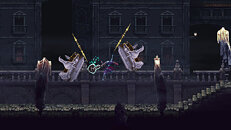
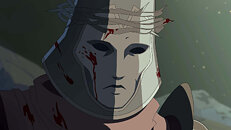
A pivotal conversation
It was March 12, 2020 when the team gathered to discuss whether or not they wanted to work on a sequel. Conversations began at 8:30 AM and continued through 6 PM, lunch included. There were two possible paths forward. In one, The Game Kitchen was excited about making Blasphemous 2 a reality, eager to return to the drawing board and expand on previous ideas. The other road would see the team packing their PCs and belongings once the chat concluded. Ultimately, the team decided to do both, turning the sequel into a reality but also packing up their belongings and working from home because of increased concerns around the COVID-19 pandemic. A few days later, Spain's government declared a national quarantine. "We made the call during a hard time, both social and workwise," said Producer David Erosa. Looking back, nobody regrets the decision. The one thing Erosa misses, though, is the old office. The first office had an "indie touch" that was part of its charm, including a door that was repurposed as a table. "We joked that it was The Last Door," he said in reference to the studio's first commercial game.
But once quarantine lifted—and with its staff growing in size—The Game Kitchen moved to a bigger place. During Blasphemous's development, success was tied to the studio's capacity to keep the lights on (or not) post-release. Now, the team is not only in a larger office but also split into different groups working on "multiple projects," including Blasphemous 2 and a VR board game platform called All On Board! During an hour-long online interview, Cabeza and Erosa chatted enthusiastically about the team's work during the past three years. They also kept apologizing for being interrupted by coworkers with questions, or for the loud background noise. I reassured them it was fine. After all, at the time of the interview they were less than a week away from launch—and from the day when they'd finally find out if Blasphemous 2 met people's expectations.
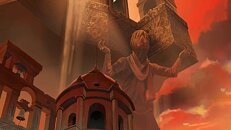
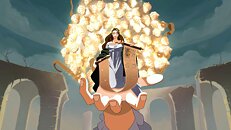
Expectations versus evolution
The first Blasphemous is a challenging hack-and-slash adventure game set in the beautifully crafted pixel world of Cvstodia. Players take control of The Penitent One, a character based on Spanish traditions. Taking cues from local influences about religion and culture, you're tasked with freeing Cvstodia of a mysterious curse while unraveling its nonlinear world. You can see hints of Dark Souls and the Metroidvania genre in Blasphemous, but its strong art direction and worldbuilding set it apart.
After three DLC expansions, Blasphemous 2 picks up with a new set of horrors tormenting Cvstodia. "Making a sequel is harder than it seems," Cabeza said. "When you're working on a first game, you're building a universe, gameplay, and tons of other things from scratch. The uncertainty is immense. But with a second game, you're balancing the need to keep certain aspects that worked in the predecessor, while also trying to explore new paths. It's a different yet equally hard kind of uncertainty."
Most of the elements that made the first Blasphemous so enticing are still present. Characters are enigmatic, enemy design is both haunting and appealing to discover, and the scenery draws from The Game Kitchen's Spanish roots. But the sequel puts additional focus on exploration, becoming a stronger Metroidvania as a result. The Penitent One also has a few more tools at his disposal, ditching his signature sword—called Mea Culpa—in order to carry three new weapons at the same time (once you've unlocked them). Each weapon connects to puzzles as well, integrating all elements together nicely.
Managing player expectations is a new territory for The Game Kitchen. The team kept players in mind during development, wondering whether the changes would resonate with them. "It's hard to find a balance between what we want to do and what fans expect us to do," Erosa said. "What will fans think about the new weapons or the absence of Mea Culpa? It's a different pressure. But these are all 'bets' that we placed for the game's vision." Starting anew also meant looking back on the development of Blasphemous and deciding what to do differently. This process began with the decision to discard Blaphemous's code base and build a new foundation.
"It's not that it would have been impossible to implement certain design and narrative decisions into the original code base," Erosa said, "but it would have been extremely convoluted. This includes The Penitent One's own design, as we know one of the main complaints from players was his movement. We improved this a lot with the first DLC, but there was room for improvement still. We took a decision that we knew was risky, but ultimately it was the right call."
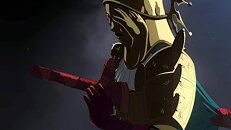
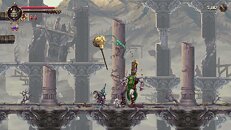
More than just an influence
In a report from Vice in 2020, The Game Kitchen spoke about how they originally wrote Blasphemous's script in Spanish—but due to monetary and time constraints, the team opted to translate and record the script in English. "The English version was the right commercial choice to make back then," said producer and CEO Mauricio García. I'm from Argentina, which means Latin American Spanish is my native language. Since 2017, I've been working for international outlets in my second language instead. In my day-to-day, I'm surrounded by English—everything from the devices I use to the films and video games I interact with are set in said language.
But the first thing I did when booting up Blasphemous 2 was set the voices to Spanish. Before this interview started, I asked the PR representative on the call if it was okay to conduct it in Spanish, something I hadn't done in years. I saw it as a small way to pay tribute to that original idea. For me, it was a change of pace from my usual routine. Cabeza, however, stood firmly with his roots for the sequel. "I'm Spanish. I always write in Spanish first because, well, it's my language and what I'm comfortable with," he said, laughing. This was important for the game's tone as well. The team wanted to have a "literary tone," and since they're not English natives themselves, it made sense to author the script in Spanish. Once they felt comfortable and content with the result, they sent the script over to an external company for translation. From that moment on, the developers lose control over how that literary tone is translated to other languages, which is an unavoidable scenario.
"We try to examine the translations whenever we can," Erosa said. "Sometimes we find translations that are literally verbatim translations, losing the original meaning in the process. So we try to tweak them with the help of our publisher, Team 17, or the translation company to try and find a more appropriate meaning to reflect the original script's intent."
As Cabeza added, if there's a passage written in poetic form, you basically lose all meaning. That's hard to preserve in other languages. And if said translation is in a language they're not familiar with, there's not even the possibility of reviewing the translations and revising such instances. I asked the team if they'd thought about adding a message when booting the game for the first time saying that the Spanish voices are recommended for a better experience. Cabeza reaffirmed that they're happy with how both language recordings ended up. If some players want a more "precise" version, especially those who speak Spanish, then switching over to the original language in both writing and voice will lead to the best result. But they both agree that English continues to be the right commercial choice to reach a global market, and that it helps in terms of linguistic accessibility.
In the day-to-day, it's hard to escape from English as the standard. In the documentary conducted by The Game Kitchen about Blasphemous's development, there's a drawing board with sticky notes that shows up multiple times. Some of the notes are in Spanish, while others are not. The team said that, since they need to maintain communication with the publisher—which is based in the United Kingdom—much of the documentation is in English.
"Documentation aside, every piece of dialogue, lore, and literary text is written in Spanish, because it goes directly from a place of creativity to paper," Cabeza added. "It has to be the priority as the game has many expressions from our land, southern Spain—expressions that our grandmas used to say, or that come from poetry, classic novels, or the way something used to be told in old Spanish. It has to originate from that place, and then it's translated to other audiences."
Learning to play
In Spain, people spent years playing games without official translations. During the 8-bit and 16-bit eras, the practice was pretty much non-existent. Some outliers, such as Nintendo's Illusion of Time, slowly emerged over time. But during his childhood, Cabeza experienced classics like The Legend of Zelda: Link's Awakening and The Legend of Zelda: Ocarina of Time without understanding English. He didn't know where to go, what to do, or what any of the characters did. It was all trial and error, and the language barrier was prominent.
As someone who learned English thanks to exposure to international media, especially video games, I relate to these stories. Getting stuck in games for weeks until one day I suddenly pressed the right buttons at the right time, unaware of a location or item's whereabouts due to my lack of understanding, is a feeling I know all too well. For Cabeza, however, that mystery sparked his imagination in new ways. "I always remember playing Link's Awakening on [Nintendo's] Game Boy and not understanding what to do, but that activated my imagination. The game didn't limit my mind. It created a very curious effect instead."
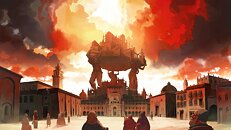
If you've ever felt that the narrative in Blasphemous isn't exactly clear, that's deliberate to an extent. It comes from the pursuit of replicating that feeling. "If I detail everything, a portion of a certain magic to it gets lost," Cabeza said. "Nowadays, there are tons of games in which characters speak a lot and explain everything perfectly, and that's when I lose interest. It disconnects me. When a character tells another 'Hey, we need to go this way, that's the cave,' and they point at it and then tell you where the exit is, it loses me. When I'm writing a narrative, I always want to leave room for imagination, not cloud it."
Being unfamiliar with English was fairly common in Spain, especially around the 1990s. Erosa added that there was a lack of plurality of media and culture compared to the present day, where films, TV shows, and video games tend to offer subtitles from the get-go. Ironically, Spain is known for dubbing media into Spanish, which doesn't tend to be the norm in other European countries. It just took longer for video games to catch up to the trend. Now, Erosa's daughter is currently playing The Legend of Zelda: Majora's Mask on the Nintendo 3DS. He said she's stuck on the final boss—only this time, it's not due to a linguistic barrier. The 3DS version includes a Spanish translation.
A success that's hard to replicate
Navigating the games industry with a language barrier was a daunting task. Seeing indie studios around the world finding success with games like Braid, Fez, and Super Meat Boy sparked inspiration. But Cabeza and Erosa called indie games in Spain a movement instead of a rising industry. In Spain, the "golden age," as Cabeza described it, took place in the time of the 8-bit computer, with platforms like the ZX Spectrum home to text-based adventure games. Yet it was hard to call it an industry back then, and all these years later that feeling still resonates.
"There are a handful of big actors, so to speak, but the rest are all small teams, not established companies," Erosa added. "Instead, it's friend groups or colleagues that get together to make a game, but there's not an industry like the one for film, or ice cream, to name a few examples. What's out there is healthy, and it's something that I believe will continue to grow in a slow but steady manner."
When asked about what's missing for the Spanish video game development movement to become an industry, the developers named multiple examples. "Education is lacking, but so is money," Erosa said, laughing. Whenever Erosa explains to friends and family what his role entails, they think it's him who's funding the project, akin to the Executive Producer role in film or television—whereas to him, he's more of an orchestra conductor, keeping things in check, coordinating with the team at large and the publisher, and so on.

"Starting from scratch is pretty much impossible," said Erosa. "We're talking about projects where you need to find a way to be sustainable. What we often witness from the outside is what's called survivor bias. You're not seeing the thousands of failures that came before that one successful game. Making games requires a lot of people and a lot of time, and you obviously need some sort of funding. Not everybody has the option to ask for money from a family member or a loan from a bank."
Funding is, of course, the main element—but also more schools, and a more understanding culture about video games in general. Teaching people that making games is a real job and getting rid of that stigma, and teaching people that as much as everybody wants to be a football player when they're young, very few people get to be one.
"It's a really hard job," Erosa said. "Just because you want to make video games doesn't mean you'll be able to make a living out of it. If you're doing it for money, you're doing it for the wrong reason. There are lots of related fields to programming, art, and design where you can make a lot more money in a more sustained and secure way than video games."
Proceed with humility
At local events, the team often finds projects that share similarities with Blasphemous. When this happens, they love to share feedback—but it's not always welcomed with open arms. Depending on how the other end is taking the comments, they decide whether or not to tell them they're part of The Game Kitchen staff. Erosa added that Spanish people tend to be very proud of themselves, but pride is something that must be put aside if you want to make a good game. When asked what they'd recommend to somebody looking to get a start, the first thing they mention is to learn English—a mandatory task to access tutorials, manuals, and documentation for engines and other tools. The second involves both humility and self-criticism.
The Game Kitchen is enthusiastic about Blasphemous 2, but the developers remain cautious all the same. Despite the confidence after seeing positive reviews ahead of launch, the real test—or trial by fire, as Erosa called it—begins once all players have access to the game. And it doesn't stop for weeks (if not months) after. Despite an exhaustive QA process, different PC setups can lead to unexpected hardware-related issues. "We know from experience that we can't be too relaxed," said Erosa. "In the end, it's the players who are our biggest critics."
"It's one thing to work on a game or a project in order to learn a new technology, whether it may be programming, modeling, or anything else," Erosa concluded. "But the moment you want to make something that's destined to be shared, whether commercially or when building a portfolio, and third parties get to see it—that's when you have to be humble, be open to self-criticism, and don't bite off more than you can chew. Games are good for what they are, not for what one pretends them to be."
View at TechPowerUp Main Site | Source
With the sequel, the team was adamant that they preserve that identity in the writing as well, regardless of which language you choose to play in. For Enrique Cabeza, Creative Director at The Game Kitchen, the development of Blasphemous 2 felt sentient. It continued to shift and morph of its own volition, almost as if providing guidance to the team about where to go next. "You have to make mistakes and realize when it's time to change course to avoid paths you shouldn't take," he said.



A pivotal conversation
It was March 12, 2020 when the team gathered to discuss whether or not they wanted to work on a sequel. Conversations began at 8:30 AM and continued through 6 PM, lunch included. There were two possible paths forward. In one, The Game Kitchen was excited about making Blasphemous 2 a reality, eager to return to the drawing board and expand on previous ideas. The other road would see the team packing their PCs and belongings once the chat concluded. Ultimately, the team decided to do both, turning the sequel into a reality but also packing up their belongings and working from home because of increased concerns around the COVID-19 pandemic. A few days later, Spain's government declared a national quarantine. "We made the call during a hard time, both social and workwise," said Producer David Erosa. Looking back, nobody regrets the decision. The one thing Erosa misses, though, is the old office. The first office had an "indie touch" that was part of its charm, including a door that was repurposed as a table. "We joked that it was The Last Door," he said in reference to the studio's first commercial game.
But once quarantine lifted—and with its staff growing in size—The Game Kitchen moved to a bigger place. During Blasphemous's development, success was tied to the studio's capacity to keep the lights on (or not) post-release. Now, the team is not only in a larger office but also split into different groups working on "multiple projects," including Blasphemous 2 and a VR board game platform called All On Board! During an hour-long online interview, Cabeza and Erosa chatted enthusiastically about the team's work during the past three years. They also kept apologizing for being interrupted by coworkers with questions, or for the loud background noise. I reassured them it was fine. After all, at the time of the interview they were less than a week away from launch—and from the day when they'd finally find out if Blasphemous 2 met people's expectations.


Expectations versus evolution
The first Blasphemous is a challenging hack-and-slash adventure game set in the beautifully crafted pixel world of Cvstodia. Players take control of The Penitent One, a character based on Spanish traditions. Taking cues from local influences about religion and culture, you're tasked with freeing Cvstodia of a mysterious curse while unraveling its nonlinear world. You can see hints of Dark Souls and the Metroidvania genre in Blasphemous, but its strong art direction and worldbuilding set it apart.
After three DLC expansions, Blasphemous 2 picks up with a new set of horrors tormenting Cvstodia. "Making a sequel is harder than it seems," Cabeza said. "When you're working on a first game, you're building a universe, gameplay, and tons of other things from scratch. The uncertainty is immense. But with a second game, you're balancing the need to keep certain aspects that worked in the predecessor, while also trying to explore new paths. It's a different yet equally hard kind of uncertainty."
Most of the elements that made the first Blasphemous so enticing are still present. Characters are enigmatic, enemy design is both haunting and appealing to discover, and the scenery draws from The Game Kitchen's Spanish roots. But the sequel puts additional focus on exploration, becoming a stronger Metroidvania as a result. The Penitent One also has a few more tools at his disposal, ditching his signature sword—called Mea Culpa—in order to carry three new weapons at the same time (once you've unlocked them). Each weapon connects to puzzles as well, integrating all elements together nicely.
Managing player expectations is a new territory for The Game Kitchen. The team kept players in mind during development, wondering whether the changes would resonate with them. "It's hard to find a balance between what we want to do and what fans expect us to do," Erosa said. "What will fans think about the new weapons or the absence of Mea Culpa? It's a different pressure. But these are all 'bets' that we placed for the game's vision." Starting anew also meant looking back on the development of Blasphemous and deciding what to do differently. This process began with the decision to discard Blaphemous's code base and build a new foundation.
"It's not that it would have been impossible to implement certain design and narrative decisions into the original code base," Erosa said, "but it would have been extremely convoluted. This includes The Penitent One's own design, as we know one of the main complaints from players was his movement. We improved this a lot with the first DLC, but there was room for improvement still. We took a decision that we knew was risky, but ultimately it was the right call."


More than just an influence
In a report from Vice in 2020, The Game Kitchen spoke about how they originally wrote Blasphemous's script in Spanish—but due to monetary and time constraints, the team opted to translate and record the script in English. "The English version was the right commercial choice to make back then," said producer and CEO Mauricio García. I'm from Argentina, which means Latin American Spanish is my native language. Since 2017, I've been working for international outlets in my second language instead. In my day-to-day, I'm surrounded by English—everything from the devices I use to the films and video games I interact with are set in said language.
But the first thing I did when booting up Blasphemous 2 was set the voices to Spanish. Before this interview started, I asked the PR representative on the call if it was okay to conduct it in Spanish, something I hadn't done in years. I saw it as a small way to pay tribute to that original idea. For me, it was a change of pace from my usual routine. Cabeza, however, stood firmly with his roots for the sequel. "I'm Spanish. I always write in Spanish first because, well, it's my language and what I'm comfortable with," he said, laughing. This was important for the game's tone as well. The team wanted to have a "literary tone," and since they're not English natives themselves, it made sense to author the script in Spanish. Once they felt comfortable and content with the result, they sent the script over to an external company for translation. From that moment on, the developers lose control over how that literary tone is translated to other languages, which is an unavoidable scenario.
"We try to examine the translations whenever we can," Erosa said. "Sometimes we find translations that are literally verbatim translations, losing the original meaning in the process. So we try to tweak them with the help of our publisher, Team 17, or the translation company to try and find a more appropriate meaning to reflect the original script's intent."
As Cabeza added, if there's a passage written in poetic form, you basically lose all meaning. That's hard to preserve in other languages. And if said translation is in a language they're not familiar with, there's not even the possibility of reviewing the translations and revising such instances. I asked the team if they'd thought about adding a message when booting the game for the first time saying that the Spanish voices are recommended for a better experience. Cabeza reaffirmed that they're happy with how both language recordings ended up. If some players want a more "precise" version, especially those who speak Spanish, then switching over to the original language in both writing and voice will lead to the best result. But they both agree that English continues to be the right commercial choice to reach a global market, and that it helps in terms of linguistic accessibility.
In the day-to-day, it's hard to escape from English as the standard. In the documentary conducted by The Game Kitchen about Blasphemous's development, there's a drawing board with sticky notes that shows up multiple times. Some of the notes are in Spanish, while others are not. The team said that, since they need to maintain communication with the publisher—which is based in the United Kingdom—much of the documentation is in English.
"Documentation aside, every piece of dialogue, lore, and literary text is written in Spanish, because it goes directly from a place of creativity to paper," Cabeza added. "It has to be the priority as the game has many expressions from our land, southern Spain—expressions that our grandmas used to say, or that come from poetry, classic novels, or the way something used to be told in old Spanish. It has to originate from that place, and then it's translated to other audiences."
Learning to play
In Spain, people spent years playing games without official translations. During the 8-bit and 16-bit eras, the practice was pretty much non-existent. Some outliers, such as Nintendo's Illusion of Time, slowly emerged over time. But during his childhood, Cabeza experienced classics like The Legend of Zelda: Link's Awakening and The Legend of Zelda: Ocarina of Time without understanding English. He didn't know where to go, what to do, or what any of the characters did. It was all trial and error, and the language barrier was prominent.
As someone who learned English thanks to exposure to international media, especially video games, I relate to these stories. Getting stuck in games for weeks until one day I suddenly pressed the right buttons at the right time, unaware of a location or item's whereabouts due to my lack of understanding, is a feeling I know all too well. For Cabeza, however, that mystery sparked his imagination in new ways. "I always remember playing Link's Awakening on [Nintendo's] Game Boy and not understanding what to do, but that activated my imagination. The game didn't limit my mind. It created a very curious effect instead."

If you've ever felt that the narrative in Blasphemous isn't exactly clear, that's deliberate to an extent. It comes from the pursuit of replicating that feeling. "If I detail everything, a portion of a certain magic to it gets lost," Cabeza said. "Nowadays, there are tons of games in which characters speak a lot and explain everything perfectly, and that's when I lose interest. It disconnects me. When a character tells another 'Hey, we need to go this way, that's the cave,' and they point at it and then tell you where the exit is, it loses me. When I'm writing a narrative, I always want to leave room for imagination, not cloud it."
Being unfamiliar with English was fairly common in Spain, especially around the 1990s. Erosa added that there was a lack of plurality of media and culture compared to the present day, where films, TV shows, and video games tend to offer subtitles from the get-go. Ironically, Spain is known for dubbing media into Spanish, which doesn't tend to be the norm in other European countries. It just took longer for video games to catch up to the trend. Now, Erosa's daughter is currently playing The Legend of Zelda: Majora's Mask on the Nintendo 3DS. He said she's stuck on the final boss—only this time, it's not due to a linguistic barrier. The 3DS version includes a Spanish translation.
A success that's hard to replicate
Navigating the games industry with a language barrier was a daunting task. Seeing indie studios around the world finding success with games like Braid, Fez, and Super Meat Boy sparked inspiration. But Cabeza and Erosa called indie games in Spain a movement instead of a rising industry. In Spain, the "golden age," as Cabeza described it, took place in the time of the 8-bit computer, with platforms like the ZX Spectrum home to text-based adventure games. Yet it was hard to call it an industry back then, and all these years later that feeling still resonates.
"There are a handful of big actors, so to speak, but the rest are all small teams, not established companies," Erosa added. "Instead, it's friend groups or colleagues that get together to make a game, but there's not an industry like the one for film, or ice cream, to name a few examples. What's out there is healthy, and it's something that I believe will continue to grow in a slow but steady manner."
When asked about what's missing for the Spanish video game development movement to become an industry, the developers named multiple examples. "Education is lacking, but so is money," Erosa said, laughing. Whenever Erosa explains to friends and family what his role entails, they think it's him who's funding the project, akin to the Executive Producer role in film or television—whereas to him, he's more of an orchestra conductor, keeping things in check, coordinating with the team at large and the publisher, and so on.

"Starting from scratch is pretty much impossible," said Erosa. "We're talking about projects where you need to find a way to be sustainable. What we often witness from the outside is what's called survivor bias. You're not seeing the thousands of failures that came before that one successful game. Making games requires a lot of people and a lot of time, and you obviously need some sort of funding. Not everybody has the option to ask for money from a family member or a loan from a bank."
Funding is, of course, the main element—but also more schools, and a more understanding culture about video games in general. Teaching people that making games is a real job and getting rid of that stigma, and teaching people that as much as everybody wants to be a football player when they're young, very few people get to be one.
"It's a really hard job," Erosa said. "Just because you want to make video games doesn't mean you'll be able to make a living out of it. If you're doing it for money, you're doing it for the wrong reason. There are lots of related fields to programming, art, and design where you can make a lot more money in a more sustained and secure way than video games."
Proceed with humility
At local events, the team often finds projects that share similarities with Blasphemous. When this happens, they love to share feedback—but it's not always welcomed with open arms. Depending on how the other end is taking the comments, they decide whether or not to tell them they're part of The Game Kitchen staff. Erosa added that Spanish people tend to be very proud of themselves, but pride is something that must be put aside if you want to make a good game. When asked what they'd recommend to somebody looking to get a start, the first thing they mention is to learn English—a mandatory task to access tutorials, manuals, and documentation for engines and other tools. The second involves both humility and self-criticism.
The Game Kitchen is enthusiastic about Blasphemous 2, but the developers remain cautious all the same. Despite the confidence after seeing positive reviews ahead of launch, the real test—or trial by fire, as Erosa called it—begins once all players have access to the game. And it doesn't stop for weeks (if not months) after. Despite an exhaustive QA process, different PC setups can lead to unexpected hardware-related issues. "We know from experience that we can't be too relaxed," said Erosa. "In the end, it's the players who are our biggest critics."
"It's one thing to work on a game or a project in order to learn a new technology, whether it may be programming, modeling, or anything else," Erosa concluded. "But the moment you want to make something that's destined to be shared, whether commercially or when building a portfolio, and third parties get to see it—that's when you have to be humble, be open to self-criticism, and don't bite off more than you can chew. Games are good for what they are, not for what one pretends them to be."
View at TechPowerUp Main Site | Source


